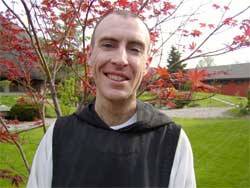How long have you been writing poetry?
Sporadicallylifelong; daily, intensivelyfor the last 6 or 7 years.
Why did you start writing?
Thats something I continue to discover each time Im given a poem to make. Stanley Kunitz spoke of ones art as the gift you have made to the world in acknowledgment of the gift you have been given, which is the life itself. And I think the world tends to forget that this is the ultimate significance of the body of work each artist produces. It is not an expression of the desire for praise and recognition, or prizes, but the deepest manifestation of your gratitude for the gift of life.
Lost and Found, I suspect, grew from and, I hope, expresses, some ray of gratefulness for the encounter it describes.
Why did you choose to join the Cistercians?
Thats also something I continue to discover. The silence, solitude and concentration, the simplicity of the life attracted me. Mertons Seven Storey Mountain and New Seeds of Contemplation meant a great deal to me; that someone with his passion for writing could make a go of it as a monk was encouraging as well. The first Cistercians called the monastery a schola caritatis, a school of love; theres nothing more important to learn, and nothing I need more help learning. Monastic life can serve as a way to remain true and faithful to the experience of Gods mercy and forgiveness that one has enjoyedand to our hearts own deepest desire.
Ultimately, of course, it was God who chose me for the life not the other way around.
Do you see any connections between your vocation as a monk and your vocation as a poet?
There are many connections: a degree of quiet and solitude, reading, leisure, the work of the heart, a certain marginality
Cloistered monastic life is something like living in a sonnet. There is a definite skeleton, a strict set of norms and limits given. For the poet, the rhyme-scheme and so on can challenge and stretch his imagination in fresh and surprising ways; they force him to question what is essential to the work and to prune away the superfluous. The rules exist to secure and support a certain inner libertyat the same time the very freedom unleashed, intensified by confinement in such tight quarters (monastic life is also like bonsai) tests and pulls against the edges. Where the mind of the poem wants to go is ultimately more important in discovering its true form than adherence to external rules just as charity often demands of monks that they bend the rules, miss an office to care for a sick brother or something.
What was the genesis of Lost and Found?
The episode described in the poem took place more or less as described. It was a Sunday afternoon; most were resting, and a few of us had just finished washing the dishes. I walked into the hall, and here was this boy. In the sonnet of cloister-life, minor disruptions, anything Out of the Ordinary, gains a particular definition. While that was the case here, at the same time the encounter felt oddly scripted. The straightforward narrative form of the poem, like the ordered, regular world of the cloister, is complicated and even subverted by the surprise presence of an unpredictable guest.
The slant allusion to the story of Jesus being found in the temple raises questions about who is who. The Word who made the universe is a 12 year old religious prodigy in 1st century Palestine who in turn is a 21st century retarded boy strolling into a cloistered monastery as Jesus entered the temple. Although its the boy whos ostensibly lost, one has the sense its the speaker, dozing over his scriptures, whos been found, and wakened, by the Word. Like the parents, the speakerand we readersfeel relieved but not altogether surprised when, after a time of dryness, the grace of our faithful God unexpectedly wanders into our ordered lives.
What is your average day like at Genesee?
This question prompts me to note that grace is not always disruptive; theres a grace of everydayness too, what one monastic writer calls creative monotony. We wake at 2 a.m. for Vigils, the first of seven times of communal prayer; after that there is a 2 to 3 hour stretch of silent prayer and reading. The rest of the day is a balance of work and prayer with intervals to read, rest and shift gears. The Mass is the center of our day, what everything flows from and converges on
We have a Web site. There is also short film about our life.
Its safe to say that, for many people, Thomas Merton is the most famous Trappist poet. What do you think of his poetry?
I think that Mertons best poetry was definitely in his prose; ironically, he wrote so much prose that it sapped the concentrated energy poetry requires as he himself observed at one point. In one of the later journals, as I recall, he expresses a desire to write less prose and focus more on poetry. Perhaps he had in the back of his mind T.S. Eliots remark: when Merton sent him some poems Eliot replied, Write less, revise more.
Who are some of your favorite poets?
Dante, Dickinson, Whitman. Among current poets, Don McKay and Charles Wright would be favorites.








